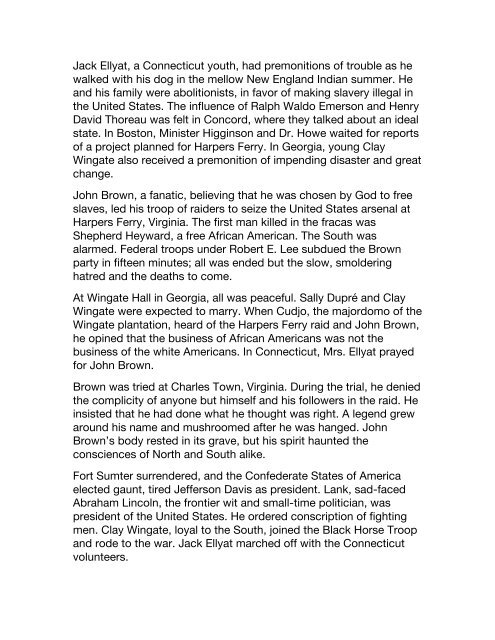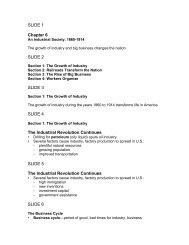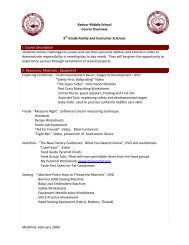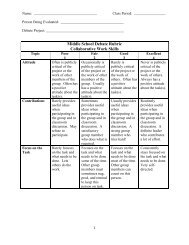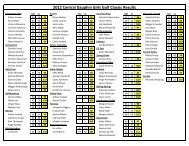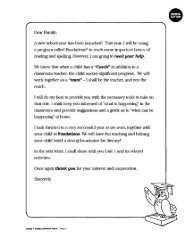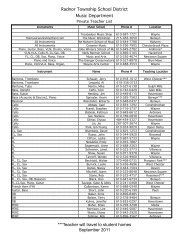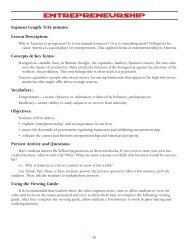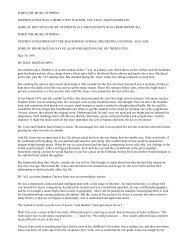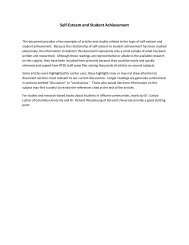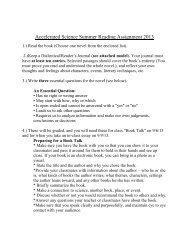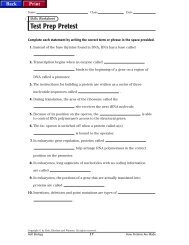John Brown's Body Summary
John Brown's Body Summary
John Brown's Body Summary
Create successful ePaper yourself
Turn your PDF publications into a flip-book with our unique Google optimized e-Paper software.
Jack Ellyat, a Connecticut youth, had premonitions of trouble as hewalked with his dog in the mellow New England Indian summer. Heand his family were abolitionists, in favor of making slavery illegal inthe United States. The influence of Ralph Waldo Emerson and HenryDavid Thoreau was felt in Concord, where they talked about an idealstate. In Boston, Minister Higginson and Dr. Howe waited for reportsof a project planned for Harpers Ferry. In Georgia, young ClayWingate also received a premonition of impending disaster and greatchange.<strong>John</strong> Brown, a fanatic, believing that he was chosen by God to freeslaves, led his troop of raiders to seize the United States arsenal atHarpers Ferry, Virginia. The first man killed in the fracas wasShepherd Heyward, a free African American. The South wasalarmed. Federal troops under Robert E. Lee subdued the Brownparty in fifteen minutes; all was ended but the slow, smolderinghatred and the deaths to come.At Wingate Hall in Georgia, all was peaceful. Sally Dupré and ClayWingate were expected to marry. When Cudjo, the majordomo of theWingate plantation, heard of the Harpers Ferry raid and <strong>John</strong> Brown,he opined that the business of African Americans was not thebusiness of the white Americans. In Connecticut, Mrs. Ellyat prayedfor <strong>John</strong> Brown.Brown was tried at Charles Town, Virginia. During the trial, he deniedthe complicity of anyone but himself and his followers in the raid. Heinsisted that he had done what he thought was right. A legend grewaround his name and mushroomed after he was hanged. <strong>John</strong>Brown’s body rested in its grave, but his spirit haunted theconsciences of North and South alike.Fort Sumter surrendered, and the Confederate States of Americaelected gaunt, tired Jefferson Davis as president. Lank, sad-facedAbraham Lincoln, the frontier wit and small-time politician, waspresident of the United States. He ordered conscription of fightingmen. Clay Wingate, loyal to the South, joined the Black Horse Troopand rode to the war. Jack Ellyat marched off with the Connecticutvolunteers.
Raw soldiers of North and South met at Bull Run under the directionof Generals McDowell, <strong>John</strong>ston, and Beauregard. Congressmenand their ladies drove out from Washington to watch the Unionvictory. While they watched, the Union lines broke and retreated inpanic. A movement to negotiate with the Confederacy for peace gotunderway in the North. Lincoln was alarmed, but he remainedsteadfast.Jack Ellyat was discharged from service after Bull Run. Later hejoined the Illinois volunteers in Chicago and became known as “BullRun Jack.” Near Pittsburg Landing, in Tennessee, he lost his headand ran during a surprise attack. He was captured but escapedagain during a night march. Hungry and weary, Jack arrived at theVilas farm, where he stayed in hiding and fell in love with MeloraVilas. At last he left the farm to seek the courage he had lost nearPittsburg Landing, but not before he had made Melora pregnant. Hewas recaptured soon afterward.Meanwhile Clay Wingate returned to Georgia on leave. At WingateHall, the war seemed far away, for the successful running of theUnion blockade of Southern ports made luxuries still available. LucyWeatherby, a Virginian whose sweetheart had been killed at BullRun, attended a dance at Wingate Hall and replaced Sally Dupré inClay’s affections. Spade, a slave on the nearby Zachary plantation,escaped that same night.New Orleans was captured. Davis and Lincoln began to bow underthe burdens of the war. McClellan began his Peninsular campaign.Lee inflicted defeat after defeat on the Army of the Potomac. JackEllyat was sent to a prison in the deep South. The fortunes of theUnion were at their lowest ebb after the Confederate victory at theSecond Battle of Manassas, and the spirit of <strong>John</strong> Brown wasgenerally invoked by editors and preachers. Lincoln issued theEmancipation Proclamation. In the meantime, Spade made his waynorth and swam across a river to freedom, but when he arrived in theland of the free he was railroaded into a labor gang. McClellan wasrelieved by Burnside, who, in turn, was relieved by Hooker, ascommander of the Army of the Potomac. Jack Ellyat, sick, wasreturned to the North in an exchange of prisoners of war.
Slowly the Confederacy began to feel the effects of the blockadeand the terrible costs of war. Clay Wingate thought of his nextleave—and of Lucy Weatherby. Jack Ellyat spent the dark winter of1862-1863 convalescing at his home in the cold Connecticut hills.He had been assigned to the Army of the Potomac as soon as hisrecovery was complete. In Tennessee, Melora Vilas gave birth to ababy boy.Grant and Sherman led the Union forces to victory in the West;Vicksburg was surrounded. Hunger and anti-inflation riots broke outin Richmond. America, meanwhile, was expanding. New industriessprang up in the North, and the West was being developed. InRichmond, Shippy, a Union spy posing as a peddler, promisedSophy, a servant at the Pollard Hotel, that he would bring her someperfume from the North. Sophy knew that Clay Wingate and LucyWeatherby had stayed together in the hotel. Luke Breckinridge,Sophy’s rebel suitor, was a member of a patrol that stopped Shippyto search him. When they found incriminating papers in his boots,Luke gloated, for he was jealous of Shippy.Stonewall Jackson was killed by his own pickets, and Lee, desperatefor provisions, invaded the North. Jack Ellyat was in the Union armythat converged on Gettysburg and was wounded during a battlethere. After three days of bloody fighting at Gettysburg, Lee fell backto Virginia. Then Vicksburg surrendered. Nearly defeated, the Southcontinued to fight doggedly. Sheridan marched through theShenandoah Valley and left it bare and burned. Petersburg wasbesieged. Luke, along with thousands of other rebel troops, desertedthe Confederate Army, and, when he headed back toward his homein the mountains, took Sophy with him. Melora and her father, <strong>John</strong>Vilas, traveled from place to place in search of Jack Ellyat; theybecame a legend in both armies. General Sherman captured Atlantaand marched on to the sea. During Sherman’s march, Wingate Hallcaught fire accidentally and burned to the ground. Clay Wingate waswounded in a rearguard action in Virginia. The war came to an endwhen Lee surrendered to Grant at Appomattox.Spade, who had gone from the labor gang into the Union Army andhad been wounded at the Petersburg crater, hired out as a farmlaborer in Cumberland County, Pennsylvania. Clay Wingate returned
to his ruined home in Georgia, where Sally Dupré was waiting. InConnecticut, Jack Ellyat heard stories of strange gypsy travelers whowere going from town to town looking for a soldier who was thefather of the child of the woman who drove the creaking cart. Oneday he was standing beneath the crossroads elms when he saw acart come slowly up the hill. He waited. The woman driving wasMelora.Critical Evaluation:Stephen Vincent Benét’s poem <strong>John</strong> Brown’s <strong>Body</strong> is one of the fewAmerican poetic works which reach epic proportions; its length ofnearly fifteen thousand lines qualifies it as an epic in the classicalsense, and ranks it, in form and purpose at least, with the greatepics of Western literature. Although the poem as a whole istraditional in its classic structure, it is distinctly and uniquelyAmerican in its atmosphere, imagery, style, and symbolism. In hisinvocation, Benét calls upon the American Muse to aid him,providing inspiration for what he humbly acknowledges to be analmost impossible task because of the magnitude of its scope. Thepoet’s Muse becomes a symbol of America, his elusive subject: Sheis beautiful and strong, colorful and diverse, a unique, mysteriousoffspring of European and native parentage. Within the poem (line311), Benét describes his work as a “cyclorama,” a series of largepictures of America spread around the reader, who views them fromthe center.The major unifying element in this cyclorama is the spirit of <strong>John</strong>Brown. Based on the historical figure of the man who raided thearsenal at Harpers Ferry, Benét’s hero becomes the focal symbol ofthe epic; although he is condemned and hanged early in the work,his memory grows into the legend that gives hope and inspirationduring the dark days of the Civil War. The second unifying threadthroughout the loosely woven eight books is provided in thecharacters of Northerner Jack Ellyat and Southerner Clay Wingate.Other minor characters help round out the scheme whereby all theregions and social groups of a huge nation are represented: MeloraVilas and her father typify the border states and the expanding West;Lucy Weatherby is the Southern coquette; Luke Breckinridge, the
independent mountaineer; Jake Diefer, the settled farmer; Spade,the runaway slave; Cudjo, the loyal slave; and Shippy, the Northernspy. By tracing the fortunes of such diverse people, Benétdramatizes not only how the war affects their lives but also how theirlives shape the nation.While Benét does not fully explore the complexities of the Northernfamily and their way of life, one of the greatest achievements of <strong>John</strong>Brown’s <strong>Body</strong> is his accurate and balanced picture of Southern life.With realism and insight, he probes the character of <strong>John</strong> Brown andof his legend. Judging the raid as foolish, he sees Brown as amurderer and a fanatic, a man so caught in his zealous dream thathe remains coldly unmoved by his son’s horrible death. Brown theman was a failure; but dead, he became a crucial legend andsymbol. Likewise, the Southern slaves are portrayed in all thecomplexity, ambiguity, and irony of their situation, and the Wingatesembody the dilemma of the genteel Southern aristocratic family.!


